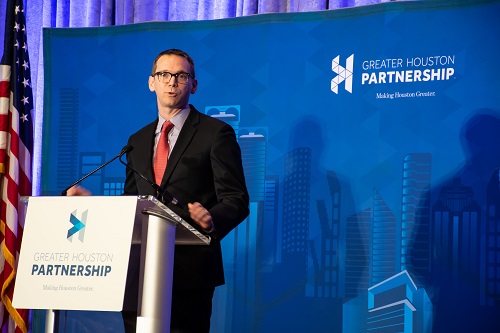TX Education Commissioner Addresses Student Outcomes, Lauds School Finance Reform at Inaugural Education Event
Published Sep 17, 2019 by Maggie Martin
Texas Education Commissioner Mike Morath laid out the challenges for public education in the state and how Texas is addressing them during his keynote address at the Partnership’s Inaugural State of Education event on September 16.
Commissioner Morath addressed more than 400 business leaders, educators and elected officials in downtown Houston.
“We are much better than we’ve ever been before," Morath said, “but we’re still not good enough for our kids. This is the story of public education.”
Morath highlighted a number of areas for improvement.
For instance, 90% of students graduate on time in Texas. But six years after they graduate high school, only about a third of students have a bachelor’s degree or associate’s degree.
“This is a huge challenge for us,” said Morath.
The education commissioner also noted the rise in student poverty in the state and that about 60% of students require some sort of subsidy so they can eat.
Commissioner Morath lauded the passage of House Bill 3 during the 86th Legislative Session earlier this year, touting the role it will have in improving student outcomes across Texas.
“This is an historic change in public policy,” said Morath.
The Partnership advocated for HB 3, which became the most consequential public school finance reform enacted since 1993. On a statewide scale, HB 3 secured:
- $11.5 billion in total funding for public education
- $6.5 billion in new state funding, including:
- $2 billion for teacher compensation and
- $4.5 billion for school finance reform
For our region, that translates into:
- $618 million in new state funding
- An additional $1,060 per student
- And a $448 million reduction in recapture
Following Commissioner Morath’s keynote address, Partnership President and CEO Bob Harvey addressed the Texas Education Agency’s accountability ratings that were released last month. Harvey noted that while more than half of Houston ISD schools received an A or B rating, over 11,000 students attended a failing school.
“For the sake of our future, we must all do better. We think the Houston Independent School District’s board's long-term failure to consistently support all of our schools, all of our kids, warrants new leadership in HISD,” said Harvey. “That is why we have called on Commissioner Morath to appoint a local board of managers to run the district that is composed of a diverse group of Houstonians who will prioritize our children and create sustainable conditions where clear-minded decisions can be made.”
Harvey said the Partnership has laid out five principles the organization believes this local board of managers must embrace, which are:
- Governance: these community leaders must prioritize our students by reconstructing a positive culture of governance and accountability within the board and the administration;
- Campus Performance: they must also focus on the needs of the lowest-performing campuses while continuing to grow excellence on successful campuses;
- Campus Autonomy: this local board of managers must establish campus-level autonomy and accountability to empower principals, faculty and teachers to implement targeted solutions aimed at improving student outcomes;
- Proven Methods: the local board of managers should also identify and implement proven methods that have led to high student achievement while supporting our educators, and;
- Community Engagement: these community leaders must engage parents and community members to become more involved from the board room to the classroom and elevate all schools and students in HISD.
As the local community navigates a period of uncertainty in Houston ISD, the Partnership will remain focused on these guiding principles for how Houston can do better for our students.
See Mike Morath's keynote address and the event's panel discussion.
Click here for more on the Partnership’s Principles for Improving Student Outcomes. Click here for Partnership President and CEO Bob Harvey’s op-ed on HISD.
 The Houston Report
The Houston Report




















